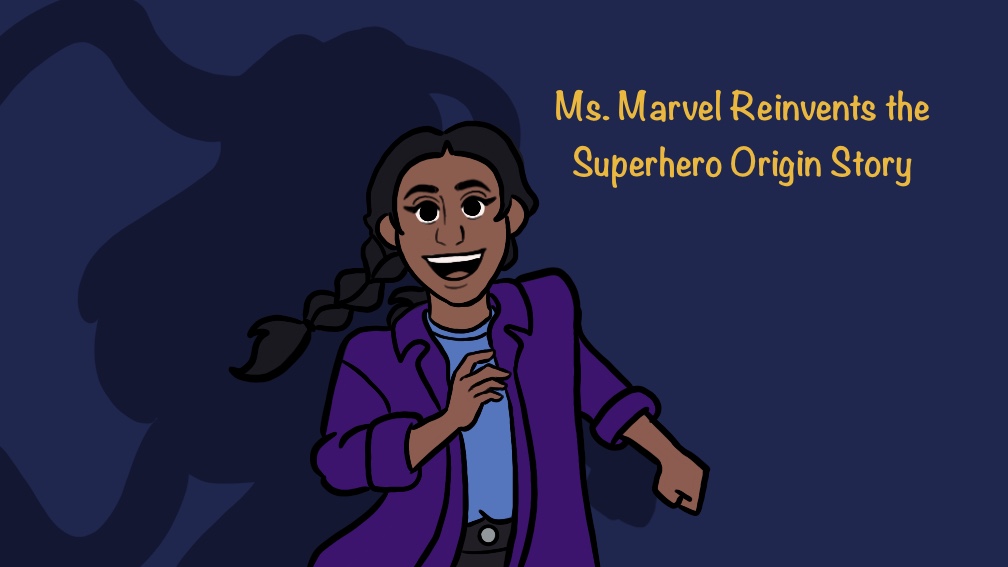Photo by Ahri Vi
** Warning: Spoilers ahead! **
The Marvel Cinematic Universe is now in its fourth phase and in its attempt to avoid stagnancy, it’s delivered more diverse and experimental projects such as Shang-Chi and the Legend of the Ten Rings and The Eternals. Yet, Ms. Marvel, a Disney+ series about a Pakistani-American teenage girl, truly brings a sense of evolution in the MCU. Ms. Marvel is currently Marvel’s highest-rated project to date.
While the revelation shown in the finale as well as the spoiler in the finale’s end credit scene are enough to gush over, Kamala Khan’s journey becoming a hero was most impactful. Kamala struggles with being a superhero as well as dealing with family drama, arguments with her friends, and debating on sacrificing her ideals in order to fit what she believes the standard superhero image to be. But, through her family, friends, community, and religion, Kamala finally becomes the hero she was always meant to be.
In the beginning of the series, Kamala tries her best to hide her powers, with her friend Bruno being the only person knowing about them. This causes issues for Kamala, as her parents are heavily involved in her life. Instead of being emotionally distant like many portrayals of immigrant parents are, Yusuf and Muneeba insist on trying to help Kamala, even if Kamala hides the truth. This leads to her ruining her brother Aamir’s wedding while trying to fight the Clandestines, a group of interdimensional beings led by the main antagonist Najma.
In being secretive, Kamala is causing a rift between her and her family and friends, specifically with her mother and her friend Nakia. Muneeba is overprotective of Kamala and doesn’t like that she’s “rebelling.” Nakia feels betrayed that Kamala didn’t trust her with the knowledge that Kamala is who the internet refers to as “Night Light” and “Light Girl.” This sense of betrayal that Nakia has stems from Nakia’s criticism of “Night Light,” as she feels that the superhero is causing more harm to the Muslim community than good when the Department of Damage Control gets involved. Damage Control began as cleaning up the aftermath of superhero battles, but is now an executive branch that arrests superheroes. Now, this government agency is targeting an already oppressed group.
Usually in these high-risk, coming-of-age narratives, the hero doesn’t have that much family to begin with, but if they do, they keep their quest/secret identity to themselves in order to protect their loved ones. It’s usually just the love interest who knows, and whether or not their family knows varies. However, once the people in Kamala’s life find out about her powers, her life instantly improves. Bruno is not only her moral support, but he helps Kamala when it comes to the scientific aspect of her powers. When Kamran loses control of his powers and has to hide in the high school from Damage Control, Kamala enlists the help of Bruno, Nakia, Kamran, Aamir, and even the popular girl Zoe to set up traps in the school to fight off the officers. This plan that Kamala and her friends came up with, while a bit ridiculous, demonstrates someone raised in a collective culture rather than the American individualistic one. Kamala is better suited working with a team than taking on heroism by herself.
Kamala’s religion heavily influences the hero she becomes. In the show, Islam is something that is involved in Kamala’s life in a positive way. Whether it’s Aamir telling Kamala to say “bismillah” before her driving test, Muneeba throwing water at Kamala to protect her from the evil eye, or trying to get Nakia elected onto the mosque council by passing flyers at Eid, Islam is just a part of Kamala’s life, yet it never feels like it’s suffocating her. Most importantly, she turns to her religion when she’s in doubt about becoming a superhero. When Kamala expresses doubt towards “Night Light” after Damage Control visits the mosque, the imam Sheikh Abdullah reminds her that while “Night Light” still saved a boy’s life. He tells her “Good is not a thing you are. It’s a thing you do.”
Later on, after the mosque gives Bruno and Kamran sanctuary from Damage Control, Sheikh Abdullah tells Kamran that he should not treat Damage Control as his enemy, even though they have deemed Kamran as one. Many heroic Western tales tend to focus on the idea of revenge, following the “eye for an eye” perspective. Kamran even begins to go down this path as he begins to fight back. And while Kamala is not present to hear his advice, she seems to follow it. She actively protects Damage Control officers, reflecting the teachings that she and Kamran have been given in their day-to-day lives.
Episode 6 begins with a disclaimer, basically warning that there are scenes that could be disturbing. This is in reference to the confrontation between Kamala and her friends and the armed Damage Control officers that takes place in the high school. Not only that, but Damage Control has no problem shooting at these brown teenagers while the community of Muslims watch in horror, including Yusuf and Muneeba. The idea that some might think the disclaimer is unnecessary, (as violence is a staple in the MCU) is concerning. The current reality of gun violence, specifically in schools, is grim. And the idea that American society is desensitized to it is especially scary. The disclaimer serves as a reminder that regardless of how prevalent gun violence is in the United States, it is still disturbing and horrific.
While understandably hard and even triggering for some to watch, it’s yet another example of the show’s excellent writing. In Spiderman: No Way Home, Damage Control was more of a nuisance to Peter Parker. Yes, they investigate him for the crimes Mysterio framed him for, but they ultimately leave him alone after his innocence is proven. Yet, with Kamala (and later Kamran), Damage Control is relentless in finding these “enhanced individuals,” even though the worst Kamala did was ruin AvengersCon and stop a boy from dying. To put it bluntly, Damage Control are infinitely more concerned about a brown person having powers than they are a white person.
After Kamala saves Damage Control and manages to get Kamran to escape, Damage Control still tries to arrest her. While the show has earlier moments where it shows how flawed Damage Control is, this scene cements just how deplorable these agents are. The bystanders go and surround Kamala, protecting her and helping her escape. No one but her family and friends know who Kamala is. Rather, they recognize that she is a hero for their community but also a child in need of protection. The importance of community is also shown through how Kamala’s superhero costume is created. The mask is gifted from Bruno, her scarf from Kareem (a vigilante of sorts that she befriends), the bangle from her grandmother Sana, and the actual costume itself being made in Pakistan and given to Kamala by her mother. Kamala’s new costume reflects her, rather than an imitation of Captain Marvel like in earlier episodes.
A big part of every origin story is getting a superhero name. In the Ms. Marvel comics, the lightning bolt on Kamala’s costume comes from Carol Danvers original costume when she was Ms. Marvel. However, in the MCU, Carol Danvers never was Ms. Marvel. So, there needed to be a new origin for Kamala’s outfit. The “lightning bolt” is actually the first letter in Kamala’s name when written in Arabic, although that’s not its only meaning.
Towards the end of episode 6, Yusuf explains that the name “Kamala” comes from the word “kamal,” which in Arabic means “perfect,” but in the Khan family’s native Urdu means “marvel.” This gives more importance to Kamala’s superhero name, as she is no longer in the shadow of a white woman. Instead of taking the past moniker of Carol Danvers, Kamala creates a name just for her while also paying homage to her real life identity and the woman who inspired her. This scene with Yusuf has the quintessential “what it means to be a hero” speech. You know, the “with great power comes great responsibility” moment. Yusuf tells Kamala, “You saved lives. And if you saved one life, well, you saved the world,” quoting the Quran.
Ms. Marvel is a fun and poignant show. It explores not only a culture and historical moment that many Western, non-South Asians may be unfamiliar with, but it helped enhance what could easily become a redundant genre. Many people, fans and critics of the MCU alike, have felt that the franchise has gotten stale within the last few years. A lot of the MCU is still enjoyable, but Ms. Marvel stands out as their most innovative, groundbreaking, and brave project to date. Thanks to all of the Muslim and/or South Asian writers on the show, Ms. Marvel is the future of the MCU.

